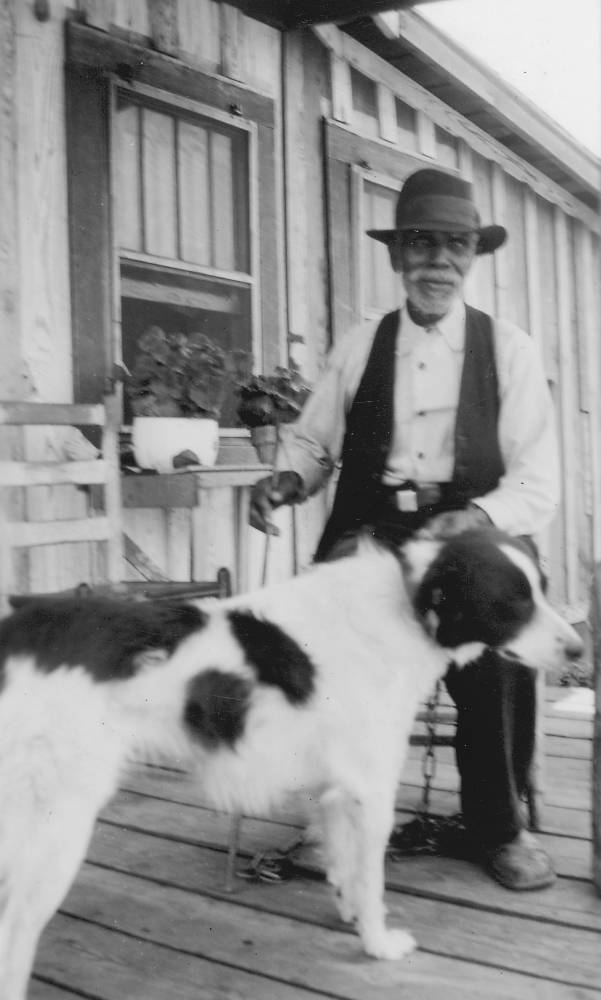Jim Crow Museum
1010 Campus Drive
Big Rapids, MI 49307
[email protected]
(231) 591-5873
Q: So, I heard that there were actual laws about Black people not being able to own
dogs during slavery times, is that true?
~ E. Ellington
Madison, Wi.
 A: Similar to how gun ownership was highly restricted for African Americans, the ownership
of dogs was also regulated, for enslaved people and for free African Americans.
A: Similar to how gun ownership was highly restricted for African Americans, the ownership
of dogs was also regulated, for enslaved people and for free African Americans.
In 1792, George Washington wrote a letter to his estate manager at Mount Vernon. In the letter, George Washington addressed some issues about dogs on the estate. Washington was very clear about his expectations about African Americans and their ownership of dogs. “It is not for any good purpose Negros raise, or keep dogs; but to aid them in their night robberies; for it is astonish to see the command under which their dogs are.” Washington also stated that if a “negro presumes under any pretence (sic) whatsoever, to preserve, or bring one into the family, that he shall be severely punished, and the dog hanged” (University of Virginia Press, n.d.).
By the 1800s, several states had laws that prohibited the ownership of dogs by African Americans or limited the number of dogs a Black person could own. For instance, in 1806, a bill was passed in Maryland making it unlawful for any “negro or mulatto” within the state to keep any dog, except “he be a free negro or mulatto,” and in that case, he may be permitted to keep one dog and be responsible to obtain a yearly license to do so (Maryland Herald & Hagerstown Advertiser, 1807).
In 1808, Thomas Jefferson, fearful of his sheep being killed by the dogs belonging to enslaved persons, wrote to the overseer in Monticello “To secure wool enough, the negroes dogs must all be killed. Do not spare a single one…Let this be carried into execution immediately” (Brodie, 1974). An 1805 code in Mississippi authorized “patrols and all other persons” “to kill all dogs owned or kept by slaves” (State of Mississippi, 1823).
In 1848, free Black people were forbidden to own dogs in Matthews County, Virginia, and by 1858, several other counties in Virginia passed similar laws. If a free Black person was found in the county with a dog, he or she could be punished by stripes (whippings) not to exceed 39 and a fine (Russell, 2009). Ten years later in 1858, South Carolina passed a law that taxed enslavers for every dog they allowed their enslaved persons to possess (Gibson, 2016).
After emancipation, it is unclear what happened to these dog ownership laws, particularly the ones that referred explicitly to free Black people. It is clear, however, that the new state governments that took over after Reconstruction recreated laws that they wanted to be a part of the Jim Crow system. To determine whether or not there were more laws or ordinances referring to dog ownership and African Americans, more research is needed.
For further reading examine, the chapter “Hated by Dogs” in David Pilgrim’s book Watermelons, Nooses, and Straight Razors. It discusses many of the ways that dogs were used to terrorize African Americans.
Franklin Hughes
Jim Crow Museum
2022
References
Brodie, F. M. (1974). Thomas Jefferson: An Intimate History. Google Books. https://books.google.nl/books?id=c4VT7_0NbxUC&pg=PA22&dq=To+secure+wool+enough,+the+negroes+dogs+must+all+be+killed.+Do+not+spare+a+single+one.+..Let+this+be+carried+into+execution+immediately+fawn+m.+brodie&hl=en&ei=UfMyTsXXDuPe0QGW55GLDA&sa=X&oi=book_result&ct=result&redir_esc=y#v=onepage&q&f=false
In Council, 1807. (1807, March 27). Maryland Herald & Hagerstown Advertiser. http://www.whilbr.org/itemdetail.aspx?idEntry=7368
Gibson, A. H. (2016). Feral Animals in the American South. Google Books. https://www.google.com/books/edition/Feral_Animals_in_the_American_South/Cl3WDAAAQBAJ?hl=en&gbpv=1&dq=negroes+owning+dogs+laws&pg=PA56&printsec=frontcover
Link, W. A. (2003). Roots of Secession. Google Books. https://www.google.com/books/edition/Roots_of_Secession/m3H5su9Tq_cC?hl=en&gbpv=1&dq=dog+ownership+laws+and+African+Americans&pg=PA300&printsec=frontcover
Pilgrim, D. (2017). Watermelons, Nooses, and Straight Razors: Stories from the Jim Crow Museum. PM Press.
Russell, J. H. (2009). The Free Negro in Virginia 1619–1865. Google Books. https://www.google.com/books/edition/The_Free_Negro_in_Virginia_1619_1865/_cXR-D6F1AYC?hl=en&gbpv=1&dq=negroes+owning+dogs+laws&pg=PA97&printsec=frontcover
State of Mississippi (1823) The Revised Code of the Laws of Mississippi, in which are Comprised All Such Acts of the General Assembly, of a Public Nature, as Were in Force at the End of the Year, 1823; with a General Index. (1823). Google Books. https://www.google.com/books/edition/The_Revised_Code_of_the_Laws_of_Mississi/sO0uAAAAYAAJ?hl=en&gbpv=1&dq=dog+ownership+laws+negroes&pg=PA440&printsec=frontcover
University of Virginia Press. (n.d.). Founders Online: From George Washington to Anthony Whitting, 16 December 1792. National Archives: Founders Online. https://founders.archives.gov/documents/Washington/05-11-02-0315#:%7E:text=It%20is%20not%20for%20any,on%20a%20Plantation%20is%20enough
Work, M. N. (1922). Negro Year Book and Annual Encyclopedia of the Negro. Google Books. https://books.google.nl/books?id=0cBFAQAAMAAJ&pg=PA145&lpg=PA145&dq=%22negroes%22+%22own+a+dog%22&source=bl&ots=hT64DB8h5v&sig=ACfU3U1HoO9r9tvYMfmkEsouW4OHonfRGQ&hl=en&sa=X&redir_esc=y#v=onepage&q=%22negroes%22%20%22own%20a%20dog%22&f=false